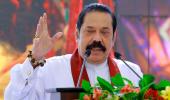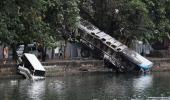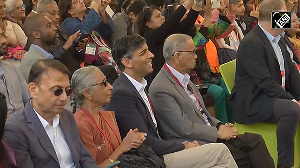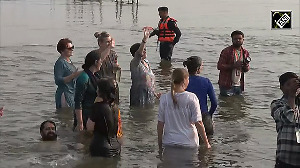Sri Lankan authorities on Wednesday deployed troops and military vehicles in the streets to ensure public security in the capital amidst nationwide protests over the government's failure to tackle the worst economic crisis.

The deployment came a day after the country's ministry of defence ordered the army, the air force and the navy to open fire on anyone looting public property or causing harm to others amidst violent protests in the island nation over the unprecedented economic and political crisis.
Army Special Forces' Combat Riders have also been deployed on mobile patrol in Colombo and suburbs, the News First newspaper reported.
”Troops & military vehicles deployed to ensure public security - Army,” it said.
President Gotabaya Rajapaksa on Wednesday urged the public to reject subversive attempts and said it is the time for all Sri Lankans to join hands as one, to overcome the economic, social and political challenges.
”This is the time for all Sri Lankans to join hands as one, to overcome the economic, social & political challenges. I urge all #Srilankans to reject the subversive attempts to push you towards racial & religious disharmony. Promoting moderation, toleration & coexistence is vital,” the president said on Twitter.
Sri Lanka's defence secretary General (retd) Kamal Gunaratne on Tuesday urged protestors to exercise calm and not resort to violence. He warned if looting and property damage continues, the ministry of defence will be compelled to strictly enforce the law against the violators.
”I appeal to young men and women to refrain from engaging in violence. Do not set fire to public and private property, and engage in your struggle in a democratic & peaceful manner,” he said.
The defence secretary warned that looters have taken the opportunity to commit crime under the guise of the peaceful protests, adding that it is a very unfortunate situation.
Mahinda, 76, resigned as prime minister on Monday amid unprecedented economic turmoil in the country, hours after his supporters attacked anti-government protesters, prompting authorities to impose a nationwide curfew and deploy Army troops in the capital. The attack triggered widespread violence against pro-Rajapaksa politicians.
At least eight people have died while over 250 people were injured in the clashes which also saw scores of properties belonging to ruling party politicians being set on fire.
President Gotabaya has urged the people to stop "violence and acts of revenge" against fellow citizens and vowed to address the political and economic crisis facing the nation Sri Lanka is facing its worst economic crisis since gaining independence from Britain in 1948.
The crisis is caused in part by a lack of foreign currency, which has meant that the country cannot afford to pay for imports of staple foods and fuel, leading to acute shortages and very high prices.
Thousands of demonstrators have hit the streets across Sri Lanka since April 9.











 © 2025
© 2025